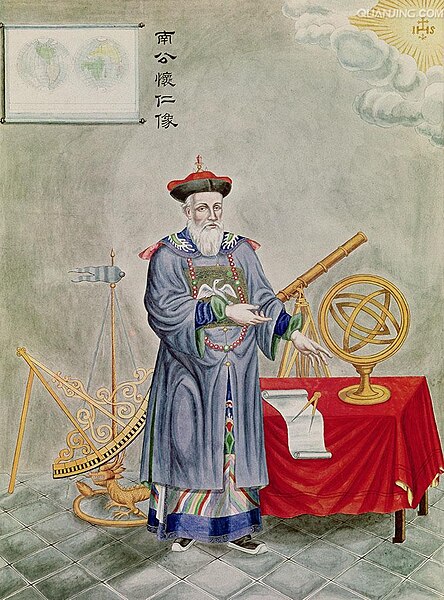An astronomer is a scientist in the field of astronomy who focuses their studies on a specific question or field outside the scope of Earth. They observe astronomical objects such as stars, planets, moons, comets and galaxies – in either observational or theoretical astronomy. Examples of topics or fields astronomers study include planetary science, solar astronomy, the origin or evolution of stars, or the formation of galaxies. A related but distinct subject is physical cosmology, which studies the Universe as a whole.
A voting session is conducted in 2006 International Astronomical Union's general assembly for determining a new definition of a planet
Galileo is often referred to as the Father of modern astronomy. Portrait by Justus Sustermans.
Johannes Kepler, one of the fathers of modern astronomy
Portrait of the Flemish astronomer Ferdinand Verbiest who became Head of the Mathematical Board and Director of the Observatory of the Chinese emperor in 1669
Astronomy is a natural science that studies celestial objects and the phenomena that occur in the cosmos. It uses mathematics, physics, and chemistry in order to explain their origin and their overall evolution. Objects of interest include planets, moons, stars, nebulae, galaxies, meteoroids, asteroids, and comets. Relevant phenomena include supernova explosions, gamma ray bursts, quasars, blazars, pulsars, and cosmic microwave background radiation. More generally, astronomy studies everything that originates beyond Earth's atmosphere. Cosmology is a branch of astronomy that studies the universe as a whole.
The Paranal Observatory of European Southern Observatory shooting a laser guide star to the Galactic Center
Astronomical Observatory, New South Wales, Australia 1873
19th-century Quito Astronomical Observatory is located 12 minutes south of the Equator in Quito, Ecuador.
The Suryaprajnaptisūtra, a 6th-century BC astronomy text of Jains at The Schoyen Collection, London. Above: its manuscript from c. 1500 AD.








